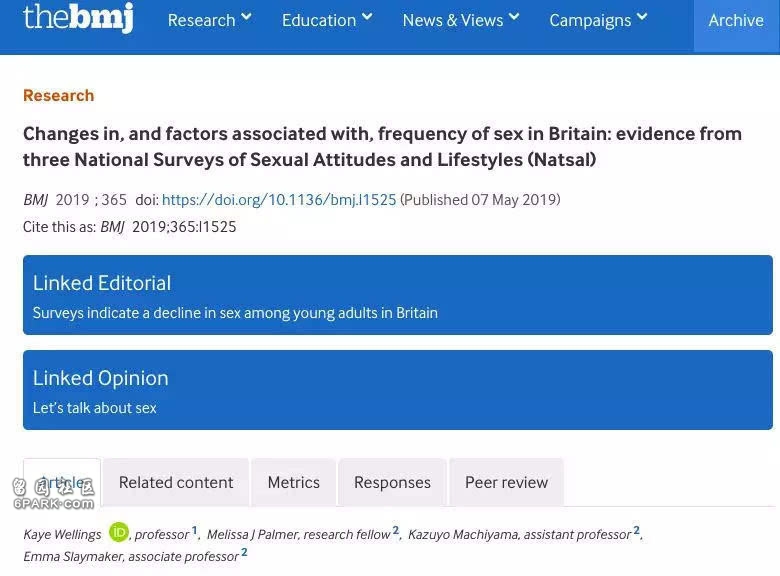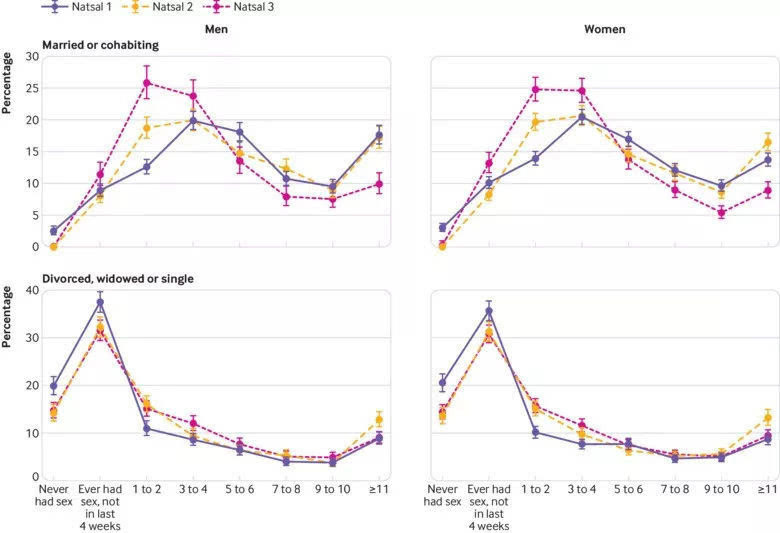
Fewer than half of British men and women have sex at least once a week
Biggest falls in sexual activity seen among over 25s and married or cohabiting couples
BMJ
Fewer than half of men and women in Britain aged 16-44 have sex at least once a week, reveals a large study published by The BMJ today.
The data show a general decline in sexual activity in Britain between 2001 and 2012, with the steepest declines among the over 25s and those who are married or living together.
There is evidence that regular sexual activity is beneficial to health and wellbeing, but a recent decline has been seen in several high-income countries in the proportion of people who are sexually active, and how often they have sex.
Little is known about these trends in Britain and the lifestyle factors associated with them.
So to explore this further, researchers at the London School of Hygiene & Tropical Medicine used data from over 34,000 men and women aged 16 to 44 years in three successive waves of the British National Survey of Sexual Attitudes and Lifestyles(Natsals 1, 2 and 3)to measure changes in actual and preferred frequency of sex, and to examine factors associated with sexual activity.
The three surveys were completed in 1991, 2001 and 2012 and reported sexual activity included vaginal, anal, or oral sex with opposite or same-sex partners.
Overall, the data show declines in people having sex between 2001 and 2012. For example, the proportion reporting no sex in the past month increased from 23% to 29.3% among women and from 26% to 29.2% among men.
The proportion reporting sex 10 or more times in the past month also fell during this time, from 20.6% to 13.2% among women and from 20.2% to 14.4% among men.
Declines in levels of sexual activity were evident across all age groups for women, and for all but the 16-24 year old age group for men, but were largest among those aged 25 and over and those who were married or living together.
For instance, the average number of times that 35-44 year olds reported having sex in the past month fell from four to two among women and from four to three among men, and the odds of reporting sex 10 or more times in the past month halved.
Similarly, among men and women who were married or living together, reported sexual inactivity in the last month was higher, while the odds of reporting sex 10 or more times in the past month were roughly halved.
Declines of this magnitude were not seen among single people, suggesting that the trend towards lower sexual frequency overall is largely due to the decline among sexually active married or cohabiting couples, say the authors.
However, the data also show that close to half of all women(50.6%)and almost two thirds of men(64.3%)said they would prefer to have sex more often, particularly those who were married or living together, which the authors say "merits concern."
People in better physical and mental health, and those who were fully employed and had higher incomes, reported having sex more often.
This is an observational study, and as such, can't establish cause. And because the data was volunteered, this may have influenced the results.
But the authors say that the changing norms around sex may affect both reported and actual sexual frequency. For example, the social pressure to over-report sexual activity may have eased, while gender equality means that women may now be less inclined to meet their partner's sexual needs irrespective of their own.
They also point out that the decline in sexual frequency appears to coincide with increasing use of social media(which has created diversions)and the global recession of 2008(which may explain the decline both among men who are better off and those worse off).
However, given the age and marital status of the groups most affected, the "most compelling" explanation may relate to the stress and 'busyness' of modern life, such that work, family life and leisure are constantly juggled, they add.
"It is perhaps the wider implications of the decline in sexual frequency that may be more worrying," write the authors. "Should frequency of sexual contact serve as a barometer for more general human connectedness then the decline might be seen as signalling a disquieting trend. The decrease in sexual activity is interesting, as yet unexplained, and warrants further exploration," they conclude.
In a linked editorial, Dr Peter Leusink from Radboud University Medical Centre says that "as the authors point out, less frequent sexual activity is not necessarily a problem for individual health and wellbeing" and the "quantity and quality of sexual activity are not necessarily connected."
He adds "Healthcare professionals should be aware of the links between sexual health, general health, and social factors and should be alert to the possibility of sexual problems during discussions with patients. [These] findings should encourage both researchers and clinicians to start talking about sex."
著名医学期刊 BMJ(British Medical Journal)今天发表的一项大型研究显示,最近十几年来,人们“啪啪啪”的次数越来越少了。研究发现,2001 - 2012 年间,英国人的性行为频率整体呈降低趋势,其中25 岁以上人群和已婚/同居人群的下降幅度最大。
一直以来,性行为调查最常见的目的是研究意外怀孕、性疾病传播、生殖系统功能障碍等公共卫生层面上的问题。但性行为与每个人的健康、幸福和生活质量之间的联系同样需要重视与探讨。
这项来自伦敦保健与热带医学院(London School of Hygiene & Tropical Medicine)的研究,通过英国性观念及生活方式问卷(British National Survey of Sexual Attitudes and Lifestyles),在 1991 年、2001 年和 2012 年对 34000 多名 16-44 岁的男性和女性进行了三次横断式调查,希望能够对性行为(同性性行为和异性行行为均包括在内)频率的变化情况进行评估,并试图寻找造成这种变化的影响因素。
总体来看,从 2001 年到 2012 年,英国人民似乎对性生活越来越没兴趣。例如,2001 年 23% 的女性表示在过去的一个月中没有发生过性行为,而 2012 年这一数字上升至 29.3%。男性也出现了同样的趋势,从 26% 增加到了 29.2%。英国 16-44 岁人群中,只有不到一半的人每周至少发生过一次性行为。
与此同时,“高活跃度”的人数也在减少:2001 年过去一个月中发生过 10 次以上性行为的女性占比 20.6%,男性占比 20.2%;2012 年这两个数字分别下降到了 13.2% 和 14.4%。
从年龄角度来看,除了 16-24 岁的男性群体,几乎所有年龄段的男性和女性的性活跃程度都在下降。其中25 岁以上以及已婚或拥有伴侣的人性活跃程度下降得最严重。
从 2001 年到 2012 年,35-44 岁的女性在过去的一个月中性行为的平均次数从 4 次降低到 2 次,男性从 4 次降低到 3 次。那些性行为高于 10 次的“活跃者”甚至下降得更明显——次数几乎减半。
已婚或共同生活的男性和女性面对着同样的情况:在过去一个月内,性行为活跃度低的人越来越多,本来活跃的也受到了削弱。
研究还发现,单身人群并没有出现这种程度的下降,这表明英国整体性行为频率降低的趋势主要是由于已婚或同居伴侣性生活减少导致的。

过去一个月内被调查者的性行为频率 | 图片来源:论文
值得注意的是,调查中接近一半的女性(50.6%)和近三分之二的男性(64.3%)表示他们希望能拥有更活跃的性生活,特别是那些结婚或已经同居的伴侣。
“低欲望社会”
研究者在英国观察到的现象并非偶然,从上世纪末到本世纪初,澳大利亚、芬兰、美国和日本都存在性行为频率降低的趋势。包括英国在内的上述西方发达国家中,已婚人群和中青年人群成为了性行为次数下跌最明显的群体。2014 年和 2017 年公布的数据显示,澳大利亚和美国的国民性行为活跃度与十几年前相比均呈下降趋势,在美国,50-60 岁是降低最明显的年龄段。
今年早些时候来自日本厚生劳动省的数字则更加夸张:从 1987 年到 2015 年开展的国家生育状况调查(只针对异性恋群体)显示,30 代前半(30-34 岁)从未有过性经历的女性比例从 6.2% 增长至 11.9%,男性从 8.8% 增长至 12.7%。30 代后半(35-39 岁)群体中,不论男性还是女性这一比例几乎都成倍增长,最高达到了9.5%。这意味着当前日本社会中可能有近十分之一的中青年在 40 岁之前从未有过异性性体验,再一次昭示了“低欲望社会”的到来。

图片来源:mag2.com
研究者表示,由于来自各个国家的调查数据采样方式和问卷设置均有差异,因此目前无法将不同研究的数据整合在一起进行综合分析。有观点认为性活跃度的降低可能与 2007 年 iPhone 出现以及 2008 年全球性金融危机有关。不过,考虑到受影响最大的群体的年龄和婚姻状况,“最有说服力”的解释可能是现代生活的压力和忙碌——在过去的十几年间,工作,家庭生活和休闲方式都在不断变化。近几年来高度发达的社交媒体和通讯手段不但带来了花样繁多的“虚拟性体验”,对真实生活中的性行为产生冲击;也模糊了生活和工作的界限,对个人生活造成影响。
论文作者认为,如果性行为频率的降低发生在更广泛的层面,可能更加令人担忧。他们总结道:“如果性行为活跃度被当做能够指示人类关系的晴雨表,那么它的降低可能被视为一种令人不安的趋势。我们观察到的这一现象很有意思,但它还没得到充分的解释,并需要进一步探索。”
在同时发表的社论中,拉德堡德大学医学中心(Radboud University Medical Centre)的 Peter Leusink 博士也表示了相同的态度:“论文指出,性行为不那么频繁并不一定代表着个人健康和福祉问题”,而且“目前没有证据表明性活动的数量和质量一定是相关的” 。
不过他补充说:“医疗保健专业人员应该了解性健康、个人健康和社会因素之间的联系,并应该在与患者交流的过程中对性因素足够重视。这些研究结果能鼓励研究人员和临床医生将性因素纳入考虑范围。”(魏潇)

















